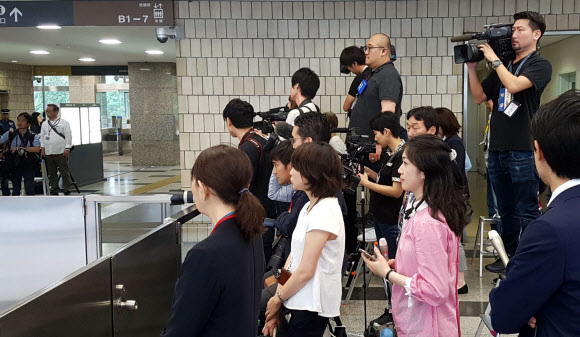 |
|
Reporters await the South Korean delegation for their working-level talks with Japan regarding the recent export controls to commence at the Japanese Ministry of Economy, Trade, and Industry (METI) on July 12. (Yonhap News)
|
Abe reverts to economic retaliation to pressure Seoul to accepting Tokyo’s strategic aims
Japan’s plan to remove South Korea from its “white list” of countries receiving favorable treatment in security terms is being read as an attempt to go beyond economic retaliation and reshape the security framework in Northeast Asia. South Korea and Japan’s security aims have grown farther apart since China’s rise in 2010 to surpass Japan as the world’s second-largest economic power and the rapid changes in the security situation unfolding around the Korean Peninsula and the US since last year. Under this set of circumstances, the Shinzo Abe administration has effectively moved to take advantage of the conflict over the Supreme Court rulings ordering compensation for forced labor mobilization to pressure South Korea into accepting Japan’s strategic aims. To start, Japan’s references to “violations of North Korea sanctions” without any clear basis in fact and its overblown claims of the potential for diversion of strategic goods to produce sarin gas are seen as taking direct aim at Seoul’s Korean Peninsula peace process – sending a calculated message to insist that Japan’s role and demands on Korean Peninsula are accepted. “Their position conveys the demand that if South Korea does not want to be left off of the ‘white list,’ it needs to reflect Japan’s demands in the inter-Korean reconciliation and Korean Peninsula peace process,” said Nam Ki-jeong, a professor at Seoul National University. “They’re trying to force South Korea to make a choice: either get on board with Japan’s vision for the Korean Peninsula, which centers on maintaining sanctions against the North, or get cut from the white list,” he said. Shin Jung-hwa, a professor at Dongseo University, explained, “For South Korea, the most important goal is dismantling the Cold War structure on the Korean Peninsula, and it anticipated that if it increased its cooperation with the US, Japan would follow along.” “But with the Abe administration seeking to curb China through a stronger alliance with the US while achieving autonomy through stronger independent military capabilities, Seoul and Tokyo’s strategic goals have continued to drift apart,” she said. After watching former South Korean President Park Geun-hye review a Chinese military parade from atop the parapet on Tiananmen Gate in 2015 and current President Moon Jae-in pursue his Korean Peninsula Peace Process, the Abe administration has concluded that there’s little chance of Japan forming common cause with South Korean vis-à-vis China or North Korea. While the conflict over the forced labor issue was the main trigger, the objective of Japan’s unprecedented economic retaliation, according to this analysis, is intensifying pressure on South Korea in the area of security. In its 2018 national defense policy report and defense guidelines, Japan removed a phrase about South Korea being “a US ally that shares our basic values and security interests” and lowered the country’s priority in security cooperation from second place to fifth place. The swift improvement of China-Japan relations that was demonstrated by Abe’s visit to China last year has also given Japan the confidence to send the message that it can “go it alone,” without South Korea. Given these considerations, Abe appears to have decided that South Korea is a “stumbling block” along the way to amending Japan’s peace constitution and making Japan an “ordinary country” that can wage war, which has been Abe’s lifelong goal. In order to forge that “ordinary country,” Japan has to play up the appeal of the “glory days” of the Meiji Era and instill pride and patriotism into the Japanese populace. Abe is lashing out harshly at South Korea for undermining his efforts by continuing to harp on its historical grievances. Limited chance of US playing active meditation role Since Japan’s behavior disturbs the trilateral system of security cooperation with the US and South Korea that has been built up since 1965, it could create a tectonic shift that affects Northeast Asia as a whole. While South Korea is working on bringing the US to its side, there’s little chance, at least for now, that the US will adopt an active role. An official from South Korea’s Ministry of Foreign Affairs (MOFA) who returned from deliberations with officials in the White House and the State Department during a trip to the US last week told reporters on July 15 that the US’ position is that it “needs to ‘engage’ to prevent the current situation from getting worse.” The official went on: “Our discussion reached the point of the US taking steps to ensure that neither country — Japan in particular — makes the situation worse. But there’s no telling how the US will engage.” As for conjectures raised in some quarters about the possibility of scrapping the General Security of Military Information Agreement (GSOMIA), which the governments of South Korea and Japan signed to facilitate sharing information about the North Korean nuclear program and missiles, the official said that “the Americans said they hoped GSOMIA wouldn’t be weakened.” That’s taken as a message that the US will control the situation to keep South Korea and Japan on board with its Asia-Pacific strategy of containing China while working behind the scenes to prevent the two countries’ conflict from heating up any further. By Park Min-hee, staff reporter Please direct comments or questions to [english@hani.co.kr]





